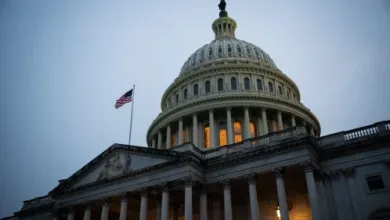Behind the Scenes of the Doha Strike: High-Stakes Meeting, 15 Fighter Jets, and a Single Target

Israeli media have revealed new details surrounding the events leading up to the Israeli airstrike on Doha on Tuesday, which targeted senior Hamas leaders in a precise and coordinated operation. The strike has intensified regional tensions and drawn international attention to Israel’s strategic military maneuvers.
The Day Before the Strike
According to a diplomatic source cited by The Jerusalem Post, Hamas received a new proposal from Qatar, originally delivered by Steve Witkoff in Paris last week. The Qatari Prime Minister reportedly met with Hamas leadership on Monday to discuss the proposal in detail.
The two sides decided to reconvene on Tuesday to analyze and negotiate the terms, which had been relayed from Turkey. This series of diplomatic meetings set the stage for the high-stakes military operation that would follow. Analysts note that such diplomatic interactions often precede major military decisions in the region, as parties attempt to reach last-minute agreements or prepare contingency plans.
Details of the Air Operation
Israeli military sources have provided several details regarding the airstrike:
-
Approximately 15 fighter jets participated in the mission, demonstrating the scale and complexity of the operation.
-
More than 10 aerial munitions were launched, hitting the designated target within seconds of each other, showcasing precision timing.
-
The strike focused on a single high-value target, ensuring maximum impact with minimal collateral damage.
-
Aircraft were refueled mid-air, allowing them to operate efficiently over long distances.
-
Pilots safely returned to Israel after completing the mission.
Military analysts emphasize that such operations require meticulous planning, real-time coordination, and the integration of intelligence from multiple sources to minimize risk and maximize operational success.
Command and Control
The strike was coordinated from Israel’s Shin Bet (Security Agency) operations room located in central Israel. While the Air Force executed the attack, overall strategic decisions were made at the highest levels of Israel’s security apparatus.
Present in the advanced command room during the operation were:
-
Prime Minister Benjamin Netanyahu
-
Defense Minister Yisrael Katz
-
Head of Military Intelligence, Shlomi Binder
-
Acting Shin Bet Chief and Deputy
Meanwhile, in the Air Force operations room, officials overseeing the execution included:
-
Chief of Staff Eyal Zamir
-
Air Force Commander, Major General Tomer Bar
The presence of top political and military leaders underscores the operation’s significance and the level of coordination required to execute such a precision strike.
Strategic and Regional Implications
The Doha strike has far-reaching implications for regional security and Israel-Hamas relations. By targeting Hamas leadership in Doha, Israel signals its willingness to act beyond its immediate borders to neutralize threats. Analysts note that such operations are designed not only to degrade enemy capabilities but also to send a strategic message to regional actors and allies.
Diplomatic sources highlight that the timing of the strike coincided with ongoing negotiations and proposals from Qatar and Turkey, reflecting the intertwined nature of military action and diplomatic maneuvering in the region. These events illustrate the complexity of Middle Eastern geopolitics, where intelligence, diplomacy, and military operations often intersect.
Media Coverage and Public Perception
The Israeli media coverage of the operation has emphasized precision and strategic coordination, aiming to inform the public while reinforcing the government’s narrative of operational success. International media outlets have also reported extensively on the strike, focusing on its potential consequences for Gaza, Qatar, and the broader Middle East.
Experts note that effective media communication is a crucial component of modern military operations. By highlighting the sophistication of the strike and the careful planning involved, Israel seeks to shape public perception and maintain domestic and international support.
Potential Diplomatic Reactions
While the strike demonstrates Israel’s military capabilities, it also raises questions about regional diplomatic responses. Qatar and Turkey, involved in the preceding negotiations, are closely monitoring the situation, as are other stakeholders in the Middle East. International observers have called for restraint and de-escalation, emphasizing the need to prevent civilian casualties and broader conflict.
U.S. diplomatic channels have reportedly been in contact with both Israel and regional partners to assess the impact of the strike and explore avenues for maintaining stability. However, the high-stakes nature of the operation suggests that Israel is prioritizing security objectives and strategic deterrence over immediate diplomatic concessions.
Operational Lessons and Analysis
Military analysts have highlighted several operational takeaways from the Doha strike:
-
The importance of real-time intelligence and precise coordination between air and ground operations.
-
Effective mid-air refueling capabilities, which extend operational reach.
-
Targeting high-value individuals with minimal collateral damage to maintain international legitimacy.
-
The integration of political oversight and military execution to ensure alignment with strategic objectives.
These lessons demonstrate Israel’s commitment to evolving its operational capabilities and maintaining a credible deterrent against Hamas and other militant organizations.
The Israeli airstrike on Doha represents a highly coordinated military operation with strategic, political, and diplomatic dimensions. By combining precision strikes with real-time intelligence and command oversight, Israel has demonstrated its capability to neutralize high-value targets while navigating complex regional dynamics.
The operation underscores the intersection of diplomacy, intelligence, and military action in the Middle East, highlighting the ongoing challenges of achieving stability in a volatile environment. Observers will be closely watching the region for further developments, as Israel and Hamas continue to engage in a tense and high-stakes confrontation.




